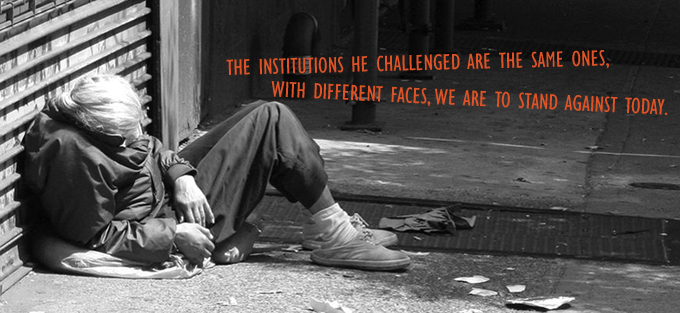by Collette Broady Grund
From the moment he began speaking, Jesus laid out an agenda that was political—especially in Luke’s gospel.
“The Spirit of the Lord is upon me,” he read from Isaiah in the synagogue in Nazareth, “because he has anointed me to bring good news to the poor. He has sent me to proclaim release to the captives and recovery of sight to the blind, to let the oppressed go free, to proclaim the year of the Lord’s favor” (Luke 4:18-19).
Then he rolled up the scroll and sat down to teach. “Today this scripture has been fulfilled in your hearing.” He claimed the old prophecy for himself, saying to the gathered of his hometown community that he was about to begin a prophetic and messianic work in the world, that he was chosen and anointed for this work.
And the tasks he was anointed to do?
Jesus’ list is full of politically dangerous assignments. To bring good news to the poor meant preaching outside of the religious establishment—in places no self-respecting rabbi would set foot. To proclaim release to the prisoners meant speaking and acting against the Roman Empire and the religious leaders who had allied with it. To let the oppressed go free and proclaim the year of jubilee or the Lord’s favor would mean undermining the empire’s economy. It would require returning land that had been sold and freeing slaves that were indentured.
Even healing the blind became politically charged when Jesus did it on the Sabbath. When Jesus called those first disciples, and later each of us, to follow him, he meant it. The work that he did is the work we are to do in his name. The people that he served are the people we are to devote our lives to lifting up. The institutions he challenged are the same ones, with different faces, we are to stand against today. And what this means for us who follow today is just as scary as it was for the disciples of Jesus’ time.
If we put God first, then a host of other people and institutions that demand priority are going to impose consequences. If we focus our proclamation of good news on the poor, leaving the privileged to the side, won’t we pay a price?
If we advocate for the release the wrongly imprisoned, the people who put them there are going to have something to say about it. If you think about that, you see why the first phrase of Jesus’ and God’s messengers is often “Do not be afraid”!
But as Emily Scott, the founding pastor of St. Lydia’s, a dinner church, put it at a “Why Christian?” conference recently, “Being a Christian is living at the fulcrum of your fear. That’s where Jesus does his best work.” The work of Jesus has always been about more than otherworldly salvation. It is about creating a just world here and now. It’s about level playing fields and a redefined society. It is about breaking people out of oppression and allowing them to claim the power of God at work—within and through them.
It is about freedom to leave our brokenness at the forgiving feet of Christ, to live as a community of equals under God, to be who we are meant to be.
Discussion questions:
1. How do the words and actions of Jesus inform your political opinions and actions?
2. What about following Jesus scares you?
3. What feels life-giving?
Closing prayer:
Jesus, you lived your life in a way that challenged the systems of your day. Thank you for your example, and for calling us to follow in your way. Draw us deeper into your justice, and surround us with community that gives us courage to speak and act in your name. Amen.
The Rev. Collette Broady Grund lives in Mankato, Minn. with her husband, their four children and two dogs. She serves Bethlehem Lutheran Church (ELCA), and blogs at The Broady Bunch.


Wonderful and powerful
What is a dinner church?
Thanks for this reminder that with our faith we do challenge systems and work for justice.
I want to read more from Collette! Is this an excerpt from a published book?
you ask:
1. How do the words and actions of Jesus inform your political opinions and actions?
Non-political as political ops and acts influences all of my life! Every day, every minute. Certainla in apositive way.
2. What about following Jesus scares you?
Nothing does! How could Jesus scare? He scares only those, who hate or deny Him.
3. What feels life-giving?
All Jesus said does and really is.
Mainly John 11,26: I am the resurrection and the life. The one who believes in me will live even if he dies, and the one who lives and believes in Me will never die. Do you believe this?”
Yes – I do believe every little detail about Jesus Christ – what He said, how He lived, and that He is God in God, light from light, True God from True God. Which Chrit even proved in His Transfiguration and later His Resurrection.